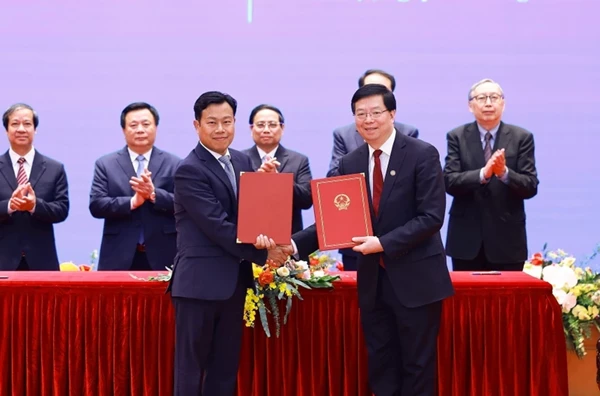How Vietnamese universities accelerate their role in global AI development
Vietnam’s role in Southeast Asia’s 2025 startup resurgence / From local innovation to global export: Vietnam’s push for eco-packaging
In 2021, the Ministry of Science and Technology of Vietnam introduced the National Strategy on Research, Development, and Application of Artificial Intelligence (AI) to 2030, outlining the country’s ambition to emerge as a regional hub for AI innovation. Central to the strategy is the establishment of reputable AI centers and the cultivation of a highly skilled workforce comprising at least 50,000 professionals in AI-related fields.
Vietnamese universities have responded proactively, forging high-impact partnerships with global institutions. Notably, Vietnam National University, Hanoi (VNU-Hanoi) signed a cooperation agreement with Tsinghua University in March 2025, launching a bilateral initiative focused on AI and digital transformation. In parallel, VinUniversity has entered into formal partnerships with Cornell University and the University of Pennsylvania, integrating AI across interdisciplinary academic programs. Vietnam Japan University (VJU), a member of VNU-Hanoi, is collaborating with Japanese experts to implement AI-powered solutions in smart agriculture, aligning with sustainability and food security goals.

Vietnam National University, Ho Chi Minh City (VNU-HCMC) has partnered with Deakin University (Australia) to facilitate joint research and postgraduate mentorship in AI. Meanwhile, the University of Engineering and Technology (VNU-Hanoi) and FPT Corporation signed a 2024 agreement to co-develop AI research initiatives through the Institute for Artificial Intelligence. In a landmark development, British University Vietnam (BUV) became the first Vietnamese institution to join the United Nations University’s Global AI Network, contributing to the global dialogue on ethical AI. Additionally, Fulbright University Vietnam received a $1.5 million grant from Google, funding faculty research and student-led AI innovation.
These collaborations have yielded tangible outcomes, including joint publications, international faculty exchanges, and improved global academic rankings. According to the Times Higher Education Asia University Rankings 2024, VNU-Hanoi recorded a notable increase in citation scores in computer science, largely driven by international co-authorship.
Training the next generation of AI talent
As part of national efforts to develop an AI-ready workforce, several Vietnamese universities are undertaking significant curriculum reforms. In 2023, Phenikaa University became one of the first private institutions in the country to launch a formal degree program in AI Engineering, featuring coursework in computer vision, big data, and robotics.
Student innovation is also gaining recognition. A team from Hanoi University of Science and Technology (HUST) reached the finals of the VinAI Challenge 2024, presenting an AI solution for public health. Simultaneously, university-based innovation hubs are nurturing student projects such as AI-powered facial recognition tools designed to enhance campus safety.
Despite notable progress, systemic challenges persist—including limited access to high-performance computing infrastructure and a shortage of experienced faculty in AI disciplines. Nevertheless, increased state funding, combined with private sector engagement from corporations such as FPT, Vingroup, and VNPT, is beginning to mitigate these constraints.
As Vietnam enters the latter half of the decade, the role of higher education institutions will be pivotal not only in advancing the country’s digital transformation agenda but also in shaping the region’s transition to AI-powered economies. Through robust partnerships, targeted investment, and talent development, Vietnam is steadily positioning itself as a key player in the Asian AI landscape.
End of content
Không có tin nào tiếp theo



